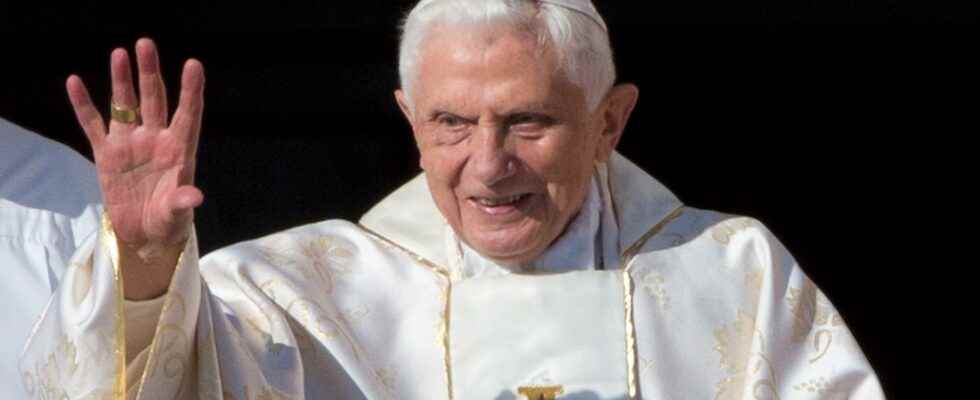Published: Just now
full screen
Next
Benedict XVI. Archive image.
1 of 2Photo: Andrew Medichini/AP/TT
At the age of 95, Benedict XVI has left earthly life. When he unexpectedly resigned the papacy in 2013, it was as one of the most influential theologians of our time.
But in the last years he lived in the shadow of the abuse scandals within the Catholic Church.
Pope Benedict – born Joseph Ratzinger in Marktl am Inn in Bavaria, Germany in 1927 – announced in Latin that he intended to abdicate on February 11, 2013, after eight years in office. When he abdicated on the 28th of the same month, he made history as the first pope to leave voluntarily in 700 years.
Benedict justified himself with failing powers in “mind and body” due to old age. During his farewell, he described how the eight years were characterized by joy, but also how they were like sailing across a stormy sea against the wind.
– But I always knew that God was in the boat and that the church’s boat is not mine, not ours, but his, and that he will not let it sink, Benedict said in a comparison between his time as pope and the biblical miracle there Jesus calms the sea during a sailing session with his disciples.
After his departure, Benedict left the Vatican in a white helicopter. The first time as a pensioner he spent in the papal holiday residence in Castel Gandolfo outside Rome. At an appearance, the then 85-year-old ex-pope said that he is “in all simplicity a pilgrim” who begins his “final journey on this earth”.
Was singled out in report
In recent years, Benedict has been drawn into the pedophile scandals that have rocked the Catholic Church.
The law firm Westpfahl Spilker Wastl identifies in a report 497 victims of sexual abuse committed by 235 people – of which 173 were priests – in the Archdiocese of Munich and Freising between 1945 and 2019.
Benedict was archbishop of that diocese between 1977 and 1982. The report singles him out for failing to act to stop four priests accused of sexually abusing children in Munich in the 1980s.
After the report was published in early 2022, Benedict apologized. But he didn’t think he had done anything wrong. That was revealed in letters his lawyers wrote to the independent investigators into the abuse.
“I have had great responsibility within the Catholic Church. Even greater is my pain over the abuses and errors committed during my time there,” Benedict wrote, while the lawyers emphasized in a separate letter that the Pope did not know about the abuses.
Philosophy and theology
Joseph Ratzinger spent his early life in the small town of Traunstein near the border with Austria. It was there that he found his Christian, human and cultural foundations.
Joseph grew up in a changing Germany and, like many other teenage boys, had to join the Hitler Youth. With his faith as a foundation, he tried to deal with the harsh and hateful Nazi society. Towards the end of World War II, he was called into the German Army’s air defense forces.
After the war, he studied philosophy and theology in Munich and Freising. He was ordained together with his brother Georg in June 1951 in the cathedral in Freising.
In the years that followed, Joseph earned a doctorate in theology and taught as a professor of theology and dogmatics at several different German universities. In 1969 he moved on to the University of Regensburg, where he eventually served as dean and vice chancellor.
“Employee of Truth”
Between the years 1962 and 1965 he served as theological advisor to the Archbishop of Cologne at the Second Vatican Council. It was during that time that he understood his calling. The period was extremely valuable for his continued life, according to the biography of Benedict on the Vatican website.
After being elevated to Cardinal and Archbishop of Munich and Freising in 1977–1982, his career within the Church continued.
Joseph Ratzinger was, among other things, prefect of the Congregation for the Faith in Rome from 1981 and chairman of the Pontifical Biblical Commission.
Even before his election as pope, he was considered one of today’s most influential theologians within the Roman Catholic Church.
He was installed as Pope on April 24, 2005.
Benedict XVI’s chosen language was “cooperators of truth” (cooperatores veritatis), which he adopted in 1977 during his time as bishop.
Facts
Benedict XVI
Born Joseph Ratzinger in Marktl am Inn in Bavaria, Germany on April 16, 1927. The parents were Joseph and Maria.
In 1941, as a 14-year-old, he joined the Hitler Youth, like most other German youth at the time. In 1944, his class was sent to Austria’s border with Hungary to dig tank obstacles. Just before the Nazis capitulated in 1945, Ratzinger deserted.
After the war, Joseph and his brother Georg started at the same seminary and were ordained in 1951.
In 1977, Ratzinger became Archbishop of Munich. Four months later, he was also appointed a cardinal by the then Pope Paul VI.
Ratzinger was for a long time the chief ideologist of Pope John Paul II. In April 2005, after the death of John Paul II, he was elected Pope under the name Benedict XVI. He resigned as Pope in February 2013.
Benedict is known as an advocate of traditional Catholic values and teachings.
Read more
